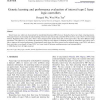Free Online Productivity Tools
i2Speak
i2Symbol
i2OCR
iTex2Img
iWeb2Print
iWeb2Shot
i2Type
iPdf2Split
iPdf2Merge
i2Bopomofo
i2Arabic
i2Style
i2Image
i2PDF
iLatex2Rtf
Sci2ools
141
click to vote
EAAI
2006
2006
Genetic learning and performance evaluation of interval type-2 fuzzy logic controllers
Type-2 fuzzy sets, which are characterized by membership functions (MFs) that are themselves fuzzy, have been attracting interest. This paper focuses on advancing the understanding of interval type-2 fuzzy logic controllers (FLCs). First, a type-2 FLC is evolved using Genetic Algorithms (GAs). The type-2 FLC is then compared with another three GA evolved type-1 FLCs that have different design parameters. The objective is to examine the amount by which the extra degrees of freedom provided by antecedent type-2 fuzzy sets is able to improve the control performance. Experimental results show that better control can be achieved using a type-2 FLC with fewer fuzzy sets/rules so one benefit of type-2 FLC is a lower trade-off between modeling accuracy and interpretability. r 2006 Elsevier Ltd. All rights reserved.
Related Content
| Added | 12 Dec 2010 |
| Updated | 12 Dec 2010 |
| Type | Journal |
| Year | 2006 |
| Where | EAAI |
| Authors | Dongrui Wu, Woei Wan Tan |
Comments (0)

